
Arquivo para a ‘Sem categoria’ Categoria
Reforming the thought, the more difficult
Among the various crises we face, once called policrise by the educator and thinker Edgar Morin, one of the deepest aspects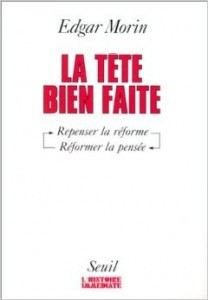 of the reform is the thought, and almost everything is framed in terms of modern thought or supposedly postmodern is in crisis.
of the reform is the thought, and almost everything is framed in terms of modern thought or supposedly postmodern is in crisis.
The book A well-made Edgar Morin Head is a brief formula, but hard, leaving a relatively simple point, say the educator, which suggested Jack Lang, the then Minister of Education in France, initially thought to make a ” manual for students, teachers and citizens “(Morin, p. 9) project that reformed and continued, proposed to overcome the current fragmentation of knowledge through complex thought, through a reform of thought through transdisciplinary teaching, capable of forming citizens planetariums, supportive and ethical, able to meet the challenges of the times.
Chapter I presents challenges, connecting knowledge in separate disciplines, proposing bringing them together in more polidisciplinares contents, cross, multidimensional, transnational, global, planetary (Morin, p.13).
Chapter 2 is the heart of the book, therefore entitled to well-made head, the philosopher Edgar Morin introduces Pascal’s quote “Do not teach men to be honest men, but it is taught everything else” is not a phrase by chance, but reveals the profound moral crisis we all face, not in Brazil but in planetary level, then where honest people can find refuge to face arrest.
In chapter chapter he explains how a general ability of intelligence, can become able to place and address problems of organized way and that makes it possible link between knowledge and giving them direction (p.21).
In chapter 3 the author deals with the human condition, subject already treated by Hannah Arendt and which is connected and part of the ontological resumed, but that depends not only on philosophical and literary reflections, but depends on the renewed and combined natural sciences, which are the subject little anthropocentric, but connected to home: Cosmology, Earth science and Ecology (p.35).
In this chapter the human being is revealed in its complexity: being, while being totally biological and cultural fully (p.40), then we could rethink the culture.
Chapter 4 Learning to live, Edgar Morin presents the thought of philosopher Emile Durkheim “the aim of education is not to transmit knowledge ever more numerous the student, but to create in him a deep and inner state, a kind of polarity spirit to guide you in a definite sense, not only during childhood but throughout life “(p.47), stop here because the thought reform is a revolution.
Philosophy, medieval history and a book
I received for review and release the cover of the book being released by M Books Brazil, Anne Rooney: 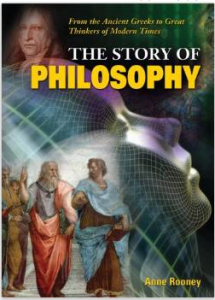 Uma História da Filosofia (translate of The History of Philosophy), the author is a professor at Trinity College in Cambridge, and a master’s degree and doctorate in Medieval Literature, subject to few, and that almost always comes up against prejudices and judgments, being a member of various bodies such as the British Royal Literature Society.
Uma História da Filosofia (translate of The History of Philosophy), the author is a professor at Trinity College in Cambridge, and a master’s degree and doctorate in Medieval Literature, subject to few, and that almost always comes up against prejudices and judgments, being a member of various bodies such as the British Royal Literature Society.
Contrary to imagine the vain philosophy, literature and medieval philosophy is very rich and is not only religious, it was during this period that remade a rereading of all of Western thought foundation issues, and in times of crisis of thought, leia- in Edgar Morin your policrise and the crisis of thought, resume aspects of Metaphysics, Epistemology, Logic, Ethics and Aesthetics, should be taken up in a profound way in the human journey.
As it appears at the opening of the book: ask questions is essential, and the presentation “is concise explanations and in a large number of examples”, with the main attempts to answers asked by philosophers in our history.
As expected explores key aspects of philosophy both in metaphysics and in ethics, and is particularly interesting your resourcefulness of Science, Arts and Technology, very difficult to approach issues in contemporary times, in which it is already the author of several books.
It is a reading that can help reflection on questions of thought today.
Banquets, dialogues, memory and love
Not only in the Christian liturgy, but in the whole philosophy and literature dining table has a strong meaning when speaking of relations and dialogue among its diners.
speaking of relations and dialogue among its diners.
The Plato’s Symposium with Phaedrus, the two dialogues of Plato whose main theme Love, Banquet Plato he talks about the nature and qualities of love, but is primarily concerned with the issues surrounding the City and philosophers.
At the Last Supper of Jesus, after numerous conversations, some made based on parables, the parable of the talents of Lazarus and the rich, the last time worker, smart administrator and so many others, he conducts a dialogue with his apostles and prepares to leave his memory, but what would be the true memorial of Jesus.
He is explicit in the Last Supper, it was common wash their hands and feet at feasts, and Jesus begins with an unusual gesture, usually the slaves washed their feet, and Jesus himself will make this gesture, trying to teach humility and service to his disciples.
Then for supper, it was Pascal supper of the Jews, but was not made on Friday, He is on Thursday because the lamb should be Slain (dead) will be himself, and there is one second unusual gesture in Jewish supper there Elijah’s cup that is always part and Jesus taking this cup (usually there are individual cups) it will use this cup, indicating that He is the one that Elijah had announced to come, take it and give it to your friends , to take along with the bread already allocated, the bread in the Jewish supper is hidden and must be found, and then he will say what is your memorial:
In Paul’s letter to the Corinthians, Jesus says “Do this in memory of me” (1 Cor 11, 24) and complete:. “Every time, in fact, you eat this bread and drink this cup, you will be proclaiming the Lord’s death until he comes “(1 Cor 11, 26).
Jesus is speaking of his death which is the apex of his love, to give his life for humanity, which should happen in the coming hours when it will be delivered to their executioners.
Alice watched Forever, which tells the story of a teacher with early Alzheimer’s disease who is preparing to memory loss and death, the actress Julianne Moore won the Oscar for best actress, and the film’s director, Richard Glatzer died March 11 of ALS, there are therefore two life lessons in the film.
In literature many plots that take place around the table, a recent novel is “Dinner”, the dutch writer Herman Koch, one of the biggest best-sellers of 2012 Europe with more than 1 million copies sold and will now for the cinema.
UN and technology for Peace
Recent UN report, as FierceGovernmentIT site, reinforces the idea that technology can help a lot in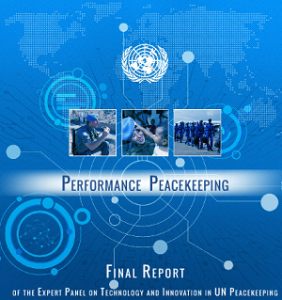 peacekeeping missions, in areas such as situational awareness, implement mandates and protection, according to the Expert Panel on Technology and Innovation for Maintenance UN peace.
peacekeeping missions, in areas such as situational awareness, implement mandates and protection, according to the Expert Panel on Technology and Innovation for Maintenance UN peace.
The report (see page) between the various recommendations of the use of technology in the areas and topics, an important aspect highlighted are certain principles that the UN has in the acquisition and use of technology.
But the focus of the panel is that you should be using widely available the technology available, but not proprietary technologies that can be relatively easy to maintain, give priority to mobility in relation to the maneuverability of assets and mobile information technology platforms are among the main recommendations ..
Some highlights of the report are protected vehicle mines, unmanned aerial vehicles, and smartphone innovations, and cites the UNMAS application.
Landmines, which maim so many people even in regions that already enjoy peace, use the type of ERW Security that can help peacekeeping missions and face the threat of landmines, explosive relics of war and improvised explosive devices, one can use the platform in multiple languages.
But the panel notes that the UN also have to deal with issues such as limited bandwidth, lack of interoperable systems, and cybersecurity
In the long run, the report says that the UN needs to create a culture of innovation.
The Trinitarian Ontology of Piero Coda and Evil
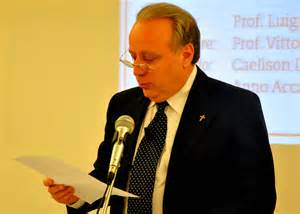 Evil, I write in capitals because it is the ontological category in which the bad of our enemies and everyday slips are just components, must be seen within the Christian tradition and many other religious traditions as what should be despised, fought and ultimately eliminated, and this is a lack of Trinitarian ontology.
Evil, I write in capitals because it is the ontological category in which the bad of our enemies and everyday slips are just components, must be seen within the Christian tradition and many other religious traditions as what should be despised, fought and ultimately eliminated, and this is a lack of Trinitarian ontology.
But if we understand the figure of the Trinity in the Christian tradition, the relationship of three persons in one being, this takes us immediately to agapic love as the basis of religion and that is where we review the misconception of God and a way of religion.
It would be possible to understand this purely philosophical way, yes and no, but because we can understand the Father as someone with some authority, his son as immanent to the Father, and the Holy Spirit as a being with a force capable of resolving differences and this authority and immanence relationship establishing communication and full communion of the three beings.
Not because we would be reducing the love agapic of three beings, who in a very profound way do they are one Being and this is not understandable without the light of faith.
Piero Coda uses a category of the Focolare Movement’s founder, who is the figure of Jesus forsaken to make this epiphany an everyday relationship with all beings and thus creates a Trinitarian ontology, which is able to establish a relationship between the express Logos in Jesus and fully realized in his figure when we lose heart and give the pain and suffering on the cross, not more calls God Father, but only God: “my God, my God why have you forsaken me” says the Biblical account.
What is the practical lesson of this biblical figure power would say something paradoxical God is no longer God, but man, a bridge between man and the Lord takes place, and continues to be held in all the pain, suffering and humanitarian disasters, then the Trinitarian ontology penetrates in daily life.
To break the “wall of hostility” (Eph 2: 14) Jesus at that time creates a new relational field, everyone has access to the Other (God) in dynamic and reciprocal motion, and this field can extend to all mankind, and performs already today dialogue between religions and cultures.
Coda says: ” in qualche modo ci é comunicata nella storia l´eterna circulazionde d´amore dei Tre … il loro aprirsi ala storia degli uomoni” (Dio uno e trino, Edizione San Paolo, 1993, p. 141).
Epiphany Eucharist and philosophy
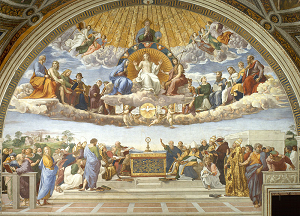 The passage of the boy-God in Earth is followed by his manifestation to men, the Epiphany, which could disappear after death and crucifixion of what was pure manifestation of the divine in the midst of the human race, we could say the manifestation of Being par excellence between beings and loved, themes dear to Husserl, Heidegger, and Derrida Deleuze..
The passage of the boy-God in Earth is followed by his manifestation to men, the Epiphany, which could disappear after death and crucifixion of what was pure manifestation of the divine in the midst of the human race, we could say the manifestation of Being par excellence between beings and loved, themes dear to Husserl, Heidegger, and Derrida Deleuze..
But there are between beings a manifestation of Being, that is those who gather in full open attitude and make it to the negation of being, to be with each other, breaking the classical logic, non-being is to be because it is to be with the other, as thought Levinas and Paul Ricoeur.
The mystical portion of the presence of Jesus, for those who believe the God-man, who on the cross is similar to hommo sacer, figure used by Giorgio Agamben and Hanna Arendt and recently also Slavoj Zizek, figure used to tell the common man deprived of his humanity, although this can not be confused with a religious figure, we could say was deprived even of this, here the epiphany becomes Eucharistia if we think of something, not in fact, pure one, even to save some trace of Being .
Eucharistia εὐχαριστία the Greek, the Catholic Christian explanation of transubstantiation of the body of Jesus in the bread and wine at the apex of a Mass, but I like to remember the Raphael above the Vatican, called “The dispute of the sacrament” between Christian and religious figures is there is a dispute between philosophy and theology or between a divine nature and a pure substance with a monstrance on an altar, puts down the religious figures amid worldly philosophers.
If there is a tension between being and the being, Deleuze says “the heavenly and a divine understanding inaccessible to our representative thought, or the infernal short, unfathomable to us, an ocean of dissimilarity”, so are not beings and things but able to think one pure Being transformed into pure thing, or rather pure “noúmeno”, the thing to the classics, misunderstood by Kant which is pure dissimilarity.
Eucharistia is being turned into noúmeno, person transformed into substance, something defined by Christians as “transubstantiation”, unfathomable but not unreachable.
Five new thinkers in 2014
 Next to already established Edgar Morin, Manuel Castells and Peter Sloterdjik, which had a famous program in Germany Rüdiger Safranski along with about culture, which lasted 10 years, and that is the end of Paul Ricoeur and Emmanuel Levinas in past century, not yet “passed”, but known by the questions and issues raised.
Next to already established Edgar Morin, Manuel Castells and Peter Sloterdjik, which had a famous program in Germany Rüdiger Safranski along with about culture, which lasted 10 years, and that is the end of Paul Ricoeur and Emmanuel Levinas in past century, not yet “passed”, but known by the questions and issues raised.
Although the best known of Sloterdjik is “Rules for the human park” by the controversy it caused, is his discussion of “spheres” and “contempt of the masses” point to the major contemporary issues.
Is that something new can still emerge? can always, I have not yet definitive opinion, but I quote a few that should be taken seriously.
I mention two Europeans: the weak-Algerian Jacques Ranciére (You can still talk about democracy?) And Piero Coda (Della Trinita), an American Martha Nussbaum (Political Emotions: Why Love Matters For Justice) and Boris Groys an American (On the New ) and could not fail to miss an oriental, of course must have other, the japanese-american Francis Fukuyama (The end of History and the last Man).
Yes Fukuyama was criticized for its “end of history”, and this may provide little attention to what could be translated as “end of historical materialism” and his book “Political Order and Political Decay” (2014), which should be read by many of the world’s political and states that have a hole (gap) history in politics, especially in the western.
Caught Ranciére and Piero Coda basic ideas to think, the first states that no one has more intelligence than anyone else and the second gives huge clues to a multicultural and multi-religious relationship to the world of today, with a history of life and not to think.
Gives food for thought and good thinking, humanity needs answers, what are the issues?

